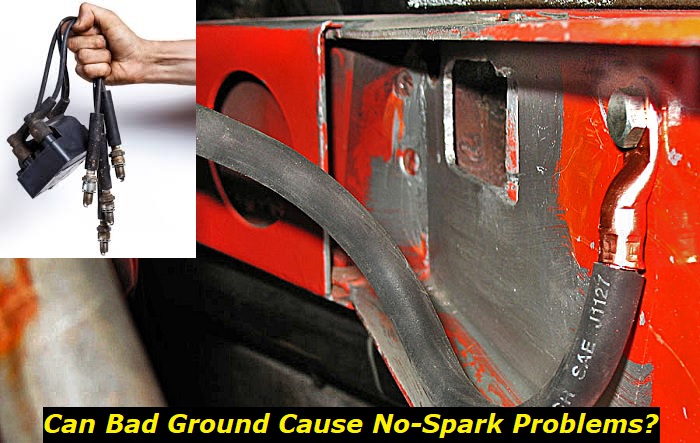The bad ground cable will cause a weak spark because of the coil getting less power but you will not feel this because if the ground is bad, your starter motor will not crank the engine. This is one of the most important things to remember when diagnosing a bad spark or no spark at all. But still, the ground wire is always worth checking up on.
Ground problems highlights
- Level of urgency:high
- DIY inspection:possible
- DIY repairs:possible
- Can you drive?usually, no
- Price of repairs:$0 - $150
- If ignored:low voltage, car glitching heavily
- Ways to fix:clean ground contacts, find a good car electrician

Where is the ground wire and what does it do?
I will start by explaining everything you should know about the ground wire. This is a wire that provides a path for current flow in your car. You may know that electricity should have a closed circuit to flow. So, if you disconnect the ground wire, there will be no way for the circuit to work. It will be disconnected and the battery will only supply a little power to each of the units and modules that consume it.
In other words, the ground wire is the participant of the circuit and if it doesn't work, the electricity can't flow in the system of your car. The majority of units will still get some power because each of them may have some grounding but since the main ground is damaged, the system can't work effectively and the power can't flow the correct way.
The ground connects the negative terminal of the car with the car body. It may not connect it directly but use the wiring harness that is connected to the battery. Also, there is usually another ground cable connecting the engine to the body. There may be other ground wires that protect electronic modules and units from high voltage and other issues.
Locating the ground in your car may be challenging since it may not be invisible due to the different plastic covers and shields under the hood of your car.
Do spark plugs and coils depend on ground?
Actually, every electrical module in your car directly depends on the ground. If the ground cable is loose and intermittently malfunctions, you may see all kinds of different problems. Most likely, the voltage in different units will heavily drop and your car will stall if it's working at the moment or will not start.
Potentially, ground will affect your ignition coils because they are integrated into the electrical system in your car. But it doesn't mean that these units are the only ones that may malfunction because of poor ground.
Until the spark plugs produce a weak spark, there will be several other critical issues that will not allow the engine to work. I will cover bad ground symptoms later in this article. But what I can say now, is the ground will not be the reason for no spark in the car. First of all, the spark will still be there, it may be quite weak, but it won't disappear totally. Secondly, you will not care about the spark problems because bad ground will cause lots of much more serious issues.
The most common culprits of the no-spark issue
Now you know that bad ground is not likely to cause the no-spark problem. What should you check if you actually don't have the spark in your car? Let's presume you can crank the engine, the starter motor works fine. This thing alone tells you that the ground is OK. But what's wrong with the spark plugs or coils and why don't they produce the spark?
If the problem is in all cylinders, it's not likely the sparks or coils - they never fail all at once. Here are the possible culprits:
1. Bad crankshaft position sensor
Your spark will fire at a certain time to ignite the gasoline in the combustion chamber at the moment when the piston is in its highest position. But how does the engine know this moment? It uses the crankshaft position sensor readings to understand this and the ECU fires the spark plug through the coil.
When the sensor is broken or sends bad readings to the ECU, the spark may fire at the incorrect moment and it may seem that the engine doesn't have the spark at all.
2. ECU problems
The ECU communicates with the ignition coils and sends signals to fire the spark. If the ECU is having a glitch, it may not send the needed signals or may send them in the wrong way. It means that the plugs will not produce a spark at all or will produce it in the wrong way.
3. Dead battery
When you are trying to start the engine, the spark is formed thanks to the power from the battery. The battery sends some electrical power to the coils and it then gets transformed to the high-voltage power in the coil and transferred to the spark plug. But if there is no power in the battery, it just can't fire all the plugs.
4. Clogged spark plugs
The spark is formed between two parts of the firing tip in the spark plug. If one or both of these parts are covered in oil deposits, fuel buildup, or any other materials, the electricity will not work to create the spark. Fouled plugs will not produce the spark at all or will produce a weak spark that can't ignite the fuel. All plugs in the engine can go bad after the car has been sitting for a very long time.
What are the bad ground symptoms in your car?
If you still suspect that the no-spark issue in your car is caused by problems with the ground, you should know how to inspect the ground problems. First of all, you should know about the symptoms that accompany this problem. Otherwise, you may inspect something that works well and doesn't require your attention.
Here are the most common symptoms of bad ground in your car:
1. Engine stalling and not starting
When there is no ground, your engine will most likely stall due to several reasons. Before it stalls, it may throw several error messages and codes because all the electronic modules will start going crazy immediately. Also, starting will be complicated because the starter motor doesn't get the needed power to crank the engine.
2. Dimming lights
You may notice that all lights in your car dim. This means that the vehicle's electrical system gets low voltage. Pretty naturally, some electronic modules just stop working, some others develop a glitch and can even burn. So, trying to start the car if you have these symptoms in it is not a wise idea.
3. Intermittent problems
Very often, the problem with the ground wire is intermittent. You go over a bump on the road and everything goes down. After you brake sharply and the car shakes because of this, everything comes to normal. This is a direct prompt that the ground wire is making up. You should check it in the first place when your car experiences these symptoms.
Can you drive with a malfunctioning ground?
If your ground cable just fell off, you will not be able to drive. The car will most likely stall or will work harshly and you will turn it off as soon as possible. Also, you won't be able to start it because the starter motor is not working when there is no ground.
But if the ground works intermittently, you can still try driving. Especially, if it doesn't fail very often. If it fails at every corner, your driving may not be that safe and I don't recommend driving on your own.
It's much safer to try and clean the connection of the ground cable and see why it may malfunction. If you can't do that, take your car in for an inspection and the skilled mechanic will quickly locate and solve the problem with the ground cable.
This issue is much more common than you may think, especially in older cars.
Final thoughts
Although the ground cable problems will cause some issues with the ignition coils and spark in your engine, this will not be the top priority problem for you. The bad ground will also cause hundreds of other issues that are more important than the problem with the ground connection.
In most cases, you will need a professional inspection if there is a problem with the ground. Otherwise, you will not be able to drive your car. Also, you may try solving this problem on your own - just locate the ground cable and check if it's working properly.
About the authors
The CarAraC research team is composed of seasoned auto mechanics and automotive industry professionals, including individuals with advanced degrees and certifications in their field. Our team members boast prestigious credentials, reflecting their extensive knowledge and skills. These qualifications include: IMI: Institute of the Motor Industry, ASE-Certified Master Automobile Technicians; Coventry University, Graduate of MA in Automotive Journalism; Politecnico di Torino, Italy, MS Automotive Engineering; Ss. Cyril and Methodius University in Skopje, Mechanical University in Skopje; TOC Automotive College; DHA Suffa University, Department of Mechanical Engineering






Add comment